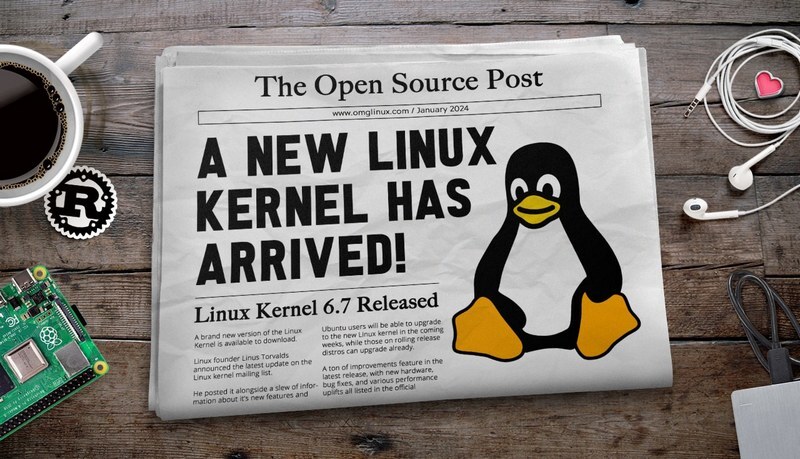 Linus Torvalds heeft versie 6.7 van de Linux Kernel vrijgegeven. De kernel is het hart van het besturingssysteem en zit, simpel gezegd, als laag tussen de hardware en de applicaties in. In versie 6.7 treffen we onder meer ondersteuning aan voor het Bcachefs-bestandssysteem, heeft Meteor Lake graphics status stabiel bereikt en is er ondersteuning voor nVidia's GPU System Processor. Meer informatie is bij 9to5Linux te vinden. Hieronder is een overzicht te vinden van de belangrijkste veranderingen uit deze uitgave.
Linus Torvalds heeft versie 6.7 van de Linux Kernel vrijgegeven. De kernel is het hart van het besturingssysteem en zit, simpel gezegd, als laag tussen de hardware en de applicaties in. In versie 6.7 treffen we onder meer ondersteuning aan voor het Bcachefs-bestandssysteem, heeft Meteor Lake graphics status stabiel bereikt en is er ondersteuning voor nVidia's GPU System Processor. Meer informatie is bij 9to5Linux te vinden. Hieronder is een overzicht te vinden van de belangrijkste veranderingen uit deze uitgave.
What’s New in Linux 6.7?Linux 6.7 introduces a suite of networking enhancements, significantly improving performance and security. Key updates include:
Advanced Filesystem and Storage Improvements
- GRO Decapsulation for IPsec ESP in UDP: Enhances the efficiency of encapsulating and decapsulating IPsec ESP packets in UDP.
- TCP Timestamps with Microsecond Resolution: This feature allows for more accurate timestamping of TCP packets, improving network performance and diagnostics.
- TCP Authentication Option (TCP-AO): A modern replacement for the MD5 option, TCP-AO enhances security in TCP/IP networking.
- Fragmented SKBs over Vsock Sockets Support: Improves data handling over virtual socket (vsock) connections, enhancing communication in virtualized environments.
- MCTP over I3C Support: This addition broadens the range of Multi-Channel Tunneling Protocol (MCTP) support to include I3C, widening Linux’s networking capabilities.
Linux 6.7 brings significant enhancements to filesystems and storage, including:
Virtualization and Architecture Support
- EXT4 File System Improvements: Enhancements to the multi-block allocator and optimization in handling released data blocks to reduce lock contention.
- Btrfs Performance Enhancements: Substantial improvements to reduce file deletion time and enhance the efficiency of critical functions.
- F2FS Bigger Page Size Support: Aligned internal block size with page size to improve efficiency, especially in zoned block device environments.
Linux 6.7 significantly expands its virtualization and architecture support:
Driver and Hardware Support Expansion
- KVM Virtualization for LoongArch and RISC-V: Introduces support for the LoongArch architecture and enhances RISC-V virtualization with Smstateen extension support.
- ARM and RISC-V Enhancements: Includes new HWCAP definitions for ARM64, support for Ampere SoC PMUs, and several improvements for RISC-V, like cbo.zero support in userspace and virtualized SBI debug console (DBCN) for KVM.
The kernel update adds numerous drivers and hardware support enhancements:
Security and Cryptography Updates
- USB Type-C Additions: New drivers and expanded support, including XHCI tracing and “La Jolla Cove Adapter (LJCA)” support.
- Enhanced Support for Lenovo Devices: Improved handling of auxiliary MAC addresses and suspend/resume functionalities for ThinkPad keyboards.
- EDAC Driver for Xilinx’s Versal Integrated Memory Controller: A new driver supporting Xilinx’s memory controller technology.
Linux 6.7 strengthens its security framework with several key updates:
Miscellaneous Enhancements
- Enhanced Crypto Support: Introduction of a virtual-address based lskcipher interface and improved AES/XTS performance for PPC.
- AppArmor Security Enhancements: Updates include mediating io_uring and userns creation and optimizations in retrieving the current task’s secid.
Additional notable enhancements in Linux 6.7 include:
- Initial Network Support for Landlock: This feature adds TCP bind and connect access control within the Landlock framework.
- Media Drivers Using VB2 kAPI: Transition of all media drivers to VB2 kAPI, moving away from the old V4L2 core videobuf kAPI.
- Support for Non-Contiguous Capacity Bitmasks: Enhancements for Intel’s CAT implementation, improving memory capacity handling.
Linux Kernel 6.7, a transient branch, will receive support for a brief period, spanning only a few months. Linus Torvalds has officially initiated the merge process for its successor, Linux Kernel 6.8. The anticipated release of Linux Kernel 6.8 is slated for mid-March 2024.


:strip_exif()/i/1274122604.png?f=thumbmedium)